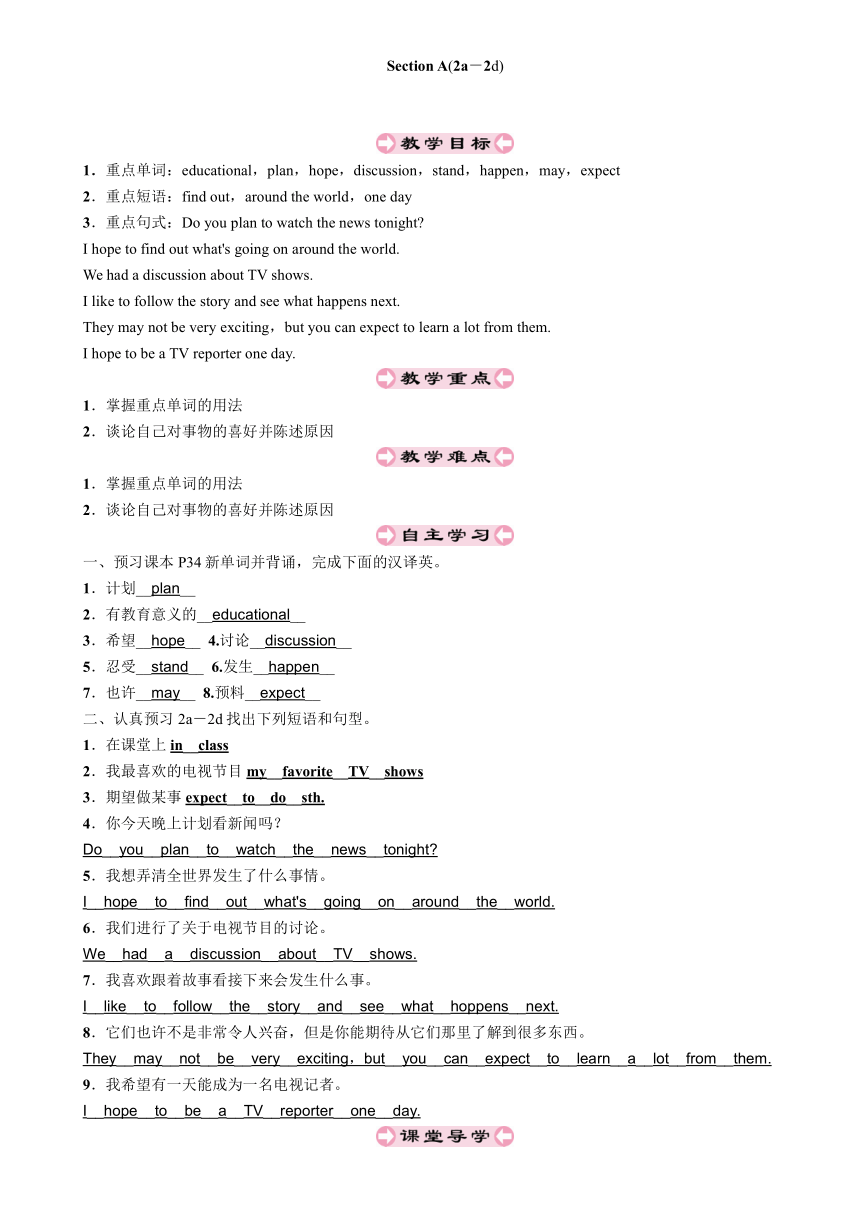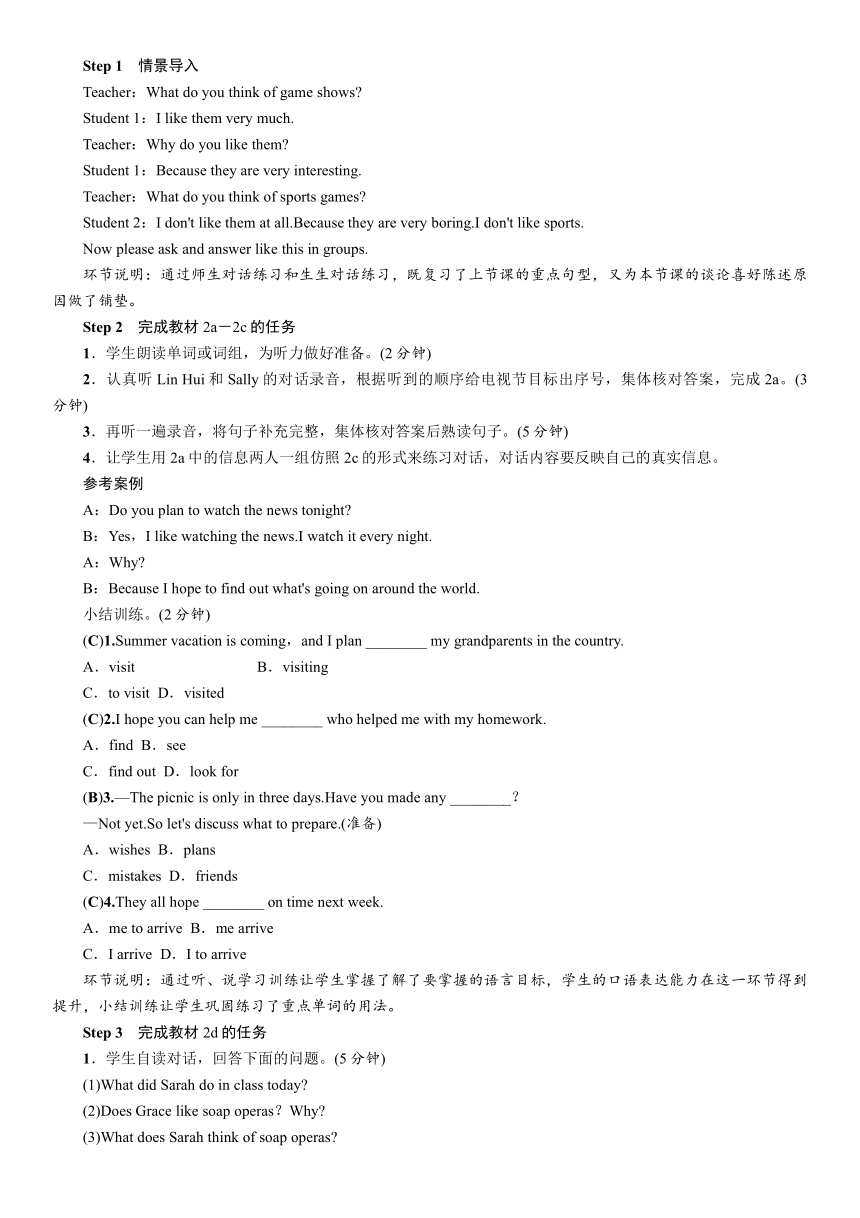人教版八年级上册Unit 5 Do you want to watch a game show?Section A(2a-2d)学案(含答案)
文档属性
| 名称 | 人教版八年级上册Unit 5 Do you want to watch a game show?Section A(2a-2d)学案(含答案) |  | |
| 格式 | doc | ||
| 文件大小 | 133.5KB | ||
| 资源类型 | 教案 | ||
| 版本资源 | 人教新目标(Go for it)版 | ||
| 科目 | 英语 | ||
| 更新时间 | 2023-07-30 19:29:12 | ||
图片预览


文档简介
Section A(2a-2d)
1.重点单词:educational,plan,hope,discussion,stand,happen,may,expect
2.重点短语:find out,around the world,one day
3.重点句式:Do you plan to watch the news tonight
I hope to find out what's going on around the world.
We had a discussion about TV shows.
I like to follow the story and see what happens next.
They may not be very exciting,but you can expect to learn a lot from them.
I hope to be a TV reporter one day.
1.掌握重点单词的用法
2.谈论自己对事物的喜好并陈述原因
1.掌握重点单词的用法
2.谈论自己对事物的喜好并陈述原因
一、预习课本P34新单词并背诵,完成下面的汉译英。
1.计划__plan__
2.有教育意义的__educational__
3.希望__hope__ 4.讨论__discussion__
5.忍受__stand__ 6.发生__happen__
7.也许__may__ 8.预料__expect__
二、认真预习2a-2d找出下列短语和句型。
1.在课堂上in__class
2.我最喜欢的电视节目my__favorite__TV__shows
3.期望做某事expect__to__do__sth.
4.你今天晚上计划看新闻吗?
Do__you__plan__to__watch__the__news__tonight
5.我想弄清全世界发生了什么事情。
I__hope__to__find__out__what's__going__on__around__the__world.
6.我们进行了关于电视节目的讨论。
We__had__a__discussion__about__TV__shows.
7.我喜欢跟着故事看接下来会发生什么事。
I__like__to__follow__the__story__and__see__what__hoppens__next.
8.它们也许不是非常令人兴奋,但是你能期待从它们那里了解到很多东西。
They__may__not__be__very__exciting,but__you__can__expect__to__learn__a__lot__from__them.
9.我希望有一天能成为一名电视记者。
I__hope__to__be__a__TV__reporter__one__day.
Step 1 情景导入
Teacher:What do you think of game shows
Student 1:I like them very much.
Teacher:Why do you like them
Student 1:Because they are very interesting.
Teacher:What do you think of sports games
Student 2:I don't like them at all.Because they are very boring.I don't like sports.
Now please ask and answer like this in groups.
环节说明:通过师生对话练习和生生对话练习,既复习了上节课的重点句型,又为本节课的谈论喜好陈述原因做了铺垫。
Step 2 完成教材2a-2c的任务
1.学生朗读单词或词组,为听力做好准备。(2分钟)
2.认真听Lin Hui和Sally的对话录音,根据听到的顺序给电视节目标出序号,集体核对答案,完成2a。(3分钟)
3.再听一遍录音,将句子补充完整,集体核对答案后熟读句子。(5分钟)
4.让学生用2a中的信息两人一组仿照2c的形式来练习对话,对话内容要反映自己的真实信息。
参考案例
A:Do you plan to watch the news tonight
B:Yes,I like watching the news.I watch it every night.
A:Why
B:Because I hope to find out what's going on around the world.
小结训练。(2分钟)
(C)1.Summer vacation is coming,and I plan ________ my grandparents in the country.
A.visit B.visiting
C.to visit D.visited
(C)2.I hope you can help me ________ who helped me with my homework.
A.find B.see
C.find out D.look for
(B)3.—The picnic is only in three days.Have you made any ________?
—Not yet.So let's discuss what to prepare.(准备)
A.wishes B.plans
C.mistakes D.friends
(C)4.They all hope ________ on time next week.
A.me to arrive B.me arrive
C.I arrive D.I to arrive
环节说明:通过听、说学习训练让学生掌握了解了要掌握的语言目标,学生的口语表达能力在这一环节得到提升,小结训练让学生巩固练习了重点单词的用法。
Step 3 完成教材2d的任务
1.学生自读对话,回答下面的问题。(5分钟)
(1)What did Sarah do in class today
(2)Does Grace like soap operas?Why
(3)What does Sarah think of soap operas
(4)Why does Sarah like news and talk shows best
2.大声朗读2d对话,读熟后与同伴结对练习,分角色表演对话。(3分钟)
3. 邀请三组学生来表演对话。(5分钟)
小结训练。(3分钟)
(B)1.I don't ________ where to eat lunch.You can decide yourself.
A.stand B.mind
C.like D.want
(C)2.Brazil has better players,So I ________ them to win.
A.hope B.except
C.expect D.prefer
(B)3.—Would you like ________ to the movie tonight
—Sure,________.
A.go;I'd love to
B.to go;I'd love to
C.going;I'd love
D.going;I'd love to
(B)4.There is ________ about H7N9 on the Internet.
A.a news B.some news
C.some newses D.many was
环节说明:将对话问题化,既能锻炼学生的思维能力又能加深对课文的理解。
Step 4 问题探究
1.plan的用法
(1)制定一个计划make__a__plan
(2)我们计划参观长城。
We__plan__to__visit__the__Great__Wall.
plan意为“计划,打算”既可以作为动词,又可以作为名词,常用的句型:计划做某事plan__to__do__sth.。
2.hope的用法
(1)我希望你能很快好起来。
I__hope__you__can__get__well__soon.
(2)我希望能很快见到你。
I__hope__to__see__you__soon.
hope意为“希望”,经常用到的句型为:希望做某事hope__to__do__sth.;hope后面还可以跟宾语从句,但是不能接双宾语。
3.expect的用法
(1)我期待着明天去北京。
We__expect__to__go__to__Beijing__tomorrow.
(2)我期待你能和我一起去北京。
I__expect__you__to__go__to__Beijing__with__me.
(3)我期待你能通过考试。
I__expect__that__you__can__pass__the__test.
expect意为“期待、盼望、预期”,其句型是:期待做某事expect__to__do__sth.;期待某人做某事expect__sb.to__do__sth.;此外expect后面还可以跟宾语从句。
4.happen的用法
(1)这个故事发生在2003年。
This__story__happened__in__2003.
(2)你怎么啦?What__happened__to__you
(3)昨天我在街上碰巧遇到了我的一个朋友。
I__happened__to__meet__a__friend__of__mine__in__the__street__yesterday.
表示“某地(某时)发生了什么事”,常用到happen__in/at__sp.这一结构来表达,此时主语应是事情。
表示“某人出了某事(常指不好的事)”,要用“sth.+happen+to sb.”这一结构来表达。
表示“某人碰巧做某事”,要用“sb.+happen+to__do sth.”这一结构来表达。
请学生们做前面课时训练部分。
1.重点单词:educational,plan,hope,discussion,stand,happen,may,expect
2.重点短语:find out,around the world,one day
3.重点句式:Do you plan to watch the news tonight
I hope to find out what's going on around the world.
We had a discussion about TV shows.
I like to follow the story and see what happens next.
They may not be very exciting,but you can expect to learn a lot from them.
I hope to be a TV reporter one day.
1.掌握重点单词的用法
2.谈论自己对事物的喜好并陈述原因
1.掌握重点单词的用法
2.谈论自己对事物的喜好并陈述原因
一、预习课本P34新单词并背诵,完成下面的汉译英。
1.计划__plan__
2.有教育意义的__educational__
3.希望__hope__ 4.讨论__discussion__
5.忍受__stand__ 6.发生__happen__
7.也许__may__ 8.预料__expect__
二、认真预习2a-2d找出下列短语和句型。
1.在课堂上in__class
2.我最喜欢的电视节目my__favorite__TV__shows
3.期望做某事expect__to__do__sth.
4.你今天晚上计划看新闻吗?
Do__you__plan__to__watch__the__news__tonight
5.我想弄清全世界发生了什么事情。
I__hope__to__find__out__what's__going__on__around__the__world.
6.我们进行了关于电视节目的讨论。
We__had__a__discussion__about__TV__shows.
7.我喜欢跟着故事看接下来会发生什么事。
I__like__to__follow__the__story__and__see__what__hoppens__next.
8.它们也许不是非常令人兴奋,但是你能期待从它们那里了解到很多东西。
They__may__not__be__very__exciting,but__you__can__expect__to__learn__a__lot__from__them.
9.我希望有一天能成为一名电视记者。
I__hope__to__be__a__TV__reporter__one__day.
Step 1 情景导入
Teacher:What do you think of game shows
Student 1:I like them very much.
Teacher:Why do you like them
Student 1:Because they are very interesting.
Teacher:What do you think of sports games
Student 2:I don't like them at all.Because they are very boring.I don't like sports.
Now please ask and answer like this in groups.
环节说明:通过师生对话练习和生生对话练习,既复习了上节课的重点句型,又为本节课的谈论喜好陈述原因做了铺垫。
Step 2 完成教材2a-2c的任务
1.学生朗读单词或词组,为听力做好准备。(2分钟)
2.认真听Lin Hui和Sally的对话录音,根据听到的顺序给电视节目标出序号,集体核对答案,完成2a。(3分钟)
3.再听一遍录音,将句子补充完整,集体核对答案后熟读句子。(5分钟)
4.让学生用2a中的信息两人一组仿照2c的形式来练习对话,对话内容要反映自己的真实信息。
参考案例
A:Do you plan to watch the news tonight
B:Yes,I like watching the news.I watch it every night.
A:Why
B:Because I hope to find out what's going on around the world.
小结训练。(2分钟)
(C)1.Summer vacation is coming,and I plan ________ my grandparents in the country.
A.visit B.visiting
C.to visit D.visited
(C)2.I hope you can help me ________ who helped me with my homework.
A.find B.see
C.find out D.look for
(B)3.—The picnic is only in three days.Have you made any ________?
—Not yet.So let's discuss what to prepare.(准备)
A.wishes B.plans
C.mistakes D.friends
(C)4.They all hope ________ on time next week.
A.me to arrive B.me arrive
C.I arrive D.I to arrive
环节说明:通过听、说学习训练让学生掌握了解了要掌握的语言目标,学生的口语表达能力在这一环节得到提升,小结训练让学生巩固练习了重点单词的用法。
Step 3 完成教材2d的任务
1.学生自读对话,回答下面的问题。(5分钟)
(1)What did Sarah do in class today
(2)Does Grace like soap operas?Why
(3)What does Sarah think of soap operas
(4)Why does Sarah like news and talk shows best
2.大声朗读2d对话,读熟后与同伴结对练习,分角色表演对话。(3分钟)
3. 邀请三组学生来表演对话。(5分钟)
小结训练。(3分钟)
(B)1.I don't ________ where to eat lunch.You can decide yourself.
A.stand B.mind
C.like D.want
(C)2.Brazil has better players,So I ________ them to win.
A.hope B.except
C.expect D.prefer
(B)3.—Would you like ________ to the movie tonight
—Sure,________.
A.go;I'd love to
B.to go;I'd love to
C.going;I'd love
D.going;I'd love to
(B)4.There is ________ about H7N9 on the Internet.
A.a news B.some news
C.some newses D.many was
环节说明:将对话问题化,既能锻炼学生的思维能力又能加深对课文的理解。
Step 4 问题探究
1.plan的用法
(1)制定一个计划make__a__plan
(2)我们计划参观长城。
We__plan__to__visit__the__Great__Wall.
plan意为“计划,打算”既可以作为动词,又可以作为名词,常用的句型:计划做某事plan__to__do__sth.。
2.hope的用法
(1)我希望你能很快好起来。
I__hope__you__can__get__well__soon.
(2)我希望能很快见到你。
I__hope__to__see__you__soon.
hope意为“希望”,经常用到的句型为:希望做某事hope__to__do__sth.;hope后面还可以跟宾语从句,但是不能接双宾语。
3.expect的用法
(1)我期待着明天去北京。
We__expect__to__go__to__Beijing__tomorrow.
(2)我期待你能和我一起去北京。
I__expect__you__to__go__to__Beijing__with__me.
(3)我期待你能通过考试。
I__expect__that__you__can__pass__the__test.
expect意为“期待、盼望、预期”,其句型是:期待做某事expect__to__do__sth.;期待某人做某事expect__sb.to__do__sth.;此外expect后面还可以跟宾语从句。
4.happen的用法
(1)这个故事发生在2003年。
This__story__happened__in__2003.
(2)你怎么啦?What__happened__to__you
(3)昨天我在街上碰巧遇到了我的一个朋友。
I__happened__to__meet__a__friend__of__mine__in__the__street__yesterday.
表示“某地(某时)发生了什么事”,常用到happen__in/at__sp.这一结构来表达,此时主语应是事情。
表示“某人出了某事(常指不好的事)”,要用“sth.+happen+to sb.”这一结构来表达。
表示“某人碰巧做某事”,要用“sb.+happen+to__do sth.”这一结构来表达。
请学生们做前面课时训练部分。
同课章节目录
- Unit 1 Where did you go on vacation?
- Section A
- Section B
- Unit 2 How often do you exercise?
- Section A
- Section B
- Unit 3 I'm more outgoing than my sister.
- Section A
- Section B
- Unit 4 What's the best movie theater?
- Section A
- Section B
- Unit 5 Do you want to watch a game show?
- Section A
- Section B
- Unit 6 I'm going to study computer science.
- Section A
- Section B
- Unit 7 Will people have robots?
- Section A
- Section B
- Unit 8 How do you make a banana milk shake?
- Section A
- Section B
- Unit 9 Can you come to my party?
- Section A
- Section B
- Unit 10 If you go to the party, you'll have a grea
- Section A
- Section B
